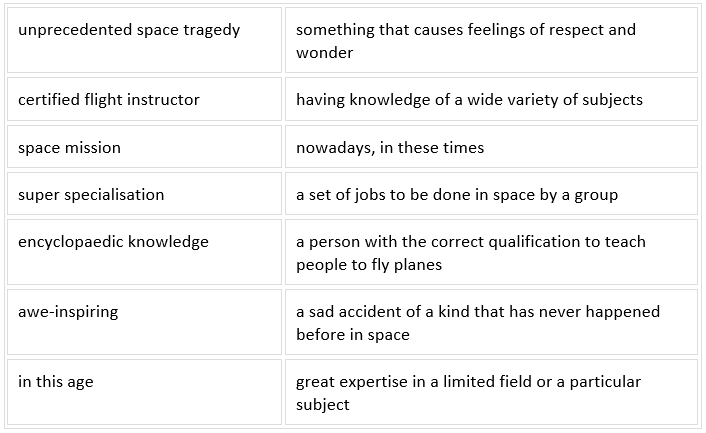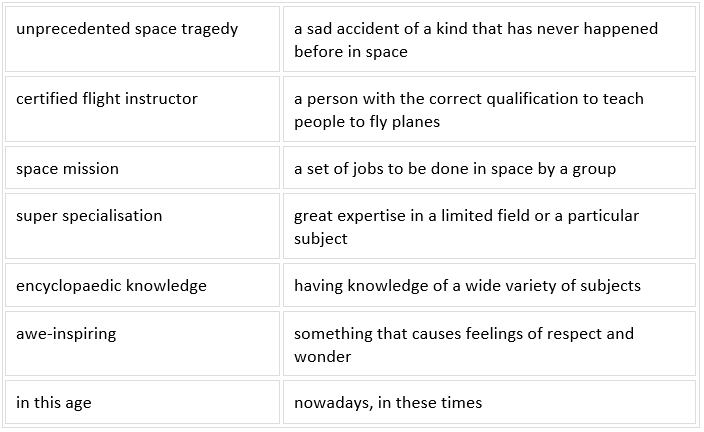NCERT Solutions for Class 6 English Honeysuckle - Chapter 4 - An Indian American Women in Space: Kalpana Chawla
1. Use a dictionary to do the tasks below.
(i) Find out the meanings of the following words and phrases (look up the words underlined in the phrases).
(a) Naturalised U.S. Citizen
Someone who was born outside of the USA but has been given legal citizenship in the USA.
(b) Space
The universe outside the earth’s atmosphere; of which earth is a part
(c) Frontiers of Space
an upper limit in a field of effort, especially one where research and development prospects have not been fully utilised
(d) Aboard
on or into a ship, plane, train, or other modes of transportation
(e) Lift-Off (How is it different from ‘take off’?)
the upward movement of a rocket, helicopter, or space vehicle as it gets off from the ground. Take off means to become airborne, not necessarily vertically.
(f) Crew
a group of persons who work on and run a ship, plane, or other types of vessel.
Working with the text
A. Answer the following questions.
1. Where was Kalpana Chawla born? Why is she called an Indian – American? (3)
Ans: Kalpana Chawla was born in Karnal, Haryana. She was called an Indian-American because she became a naturalised US citizen. citizen after marrying an American flight instructor named Jean-Pierre Harrison.
2. When and why did she go to the U.S.? Who did she marry? (2, 3)
Ans: She went to the US after completing a Bachelor of Science degree in aeronautical engineering for pursuing her master’s degree. She married flight instructor Jean-Pierre Harrison.
3. How did she become an astronaut? What gave her the idea that she could be an astronaut? (3)
Ans: After qualifying as a pilot, Chawla applied to NASA space shuttle program. She was first hired as a Research Scientist at NASA. In 1994 she was selected at NASA for training as an astronaut. It was her success as a pilot which gave her the idea that she could become an astronaut.
4. What abilities must an astronaut have, according to the journalist? (6)
Ans: According to the journalist, it takes enormous ability to be an astronaut. An astronaut must know a lot about everything, from biology to astrophysics to aeronautical engineering. In this age of super-specialisation, you must have encyclopedic knowledge to be an astronaut.
5. Describe Kalpana Chawla’s first mission in space. (5)
Ans: The first space mission in the shuttle named Columbia, was 15 days, 16 hours and 34 minutes long. She went around 252 times round the earth, almost travelling a distance of 10.45 million kilometres. The crew had a Japanese and a Ukrainian astronaut. Many experiments were performed by the crew like pollinating plants to observe growth of food in space, tests for making stronger metals and faster computer chips.
6. What does Kalpana Chawla say about pursuing a dream? Do you agree with her that success is possible? (7)
Ans: Kalpana Chawla says that "the path from dreams to success do exist. May you have the vision to find it, the courage to get onto it …" Yes, I do agree with what she said. If we dare to dream we must have the dare and determination to walk on the thorny paths too.
B. Read the newspaper report to find the following facts about the Columbia’s ill-fated voyage.
1. Date and place of lift off: ________
2. Number of astronauts on board: ________
3. Number of days it stayed in space: ________
4. Number of experiments done by scientists: ________
5. Date of return journey: ________
6. Height at which it lost contact: ________
Ans:
1. 16th January, 2003 ; Kennedy Space Center, Florida.
2. Seven
3. 15 days, 16 hours and 34 minutes
4. 80 Experiments
5. 1 February 2003
6. 2,00,000 feet
Working with the language
A. Match the following:
Ans:
B. Use these phrases in sentences of your own, after finding out their meanings.
1. broke apart 4. lifted off 7. cheered along
2. streaked over 5. blast off 8. on board
3. spread across 6. went on 9. carry on
Ans:
1. broke apart: The fire broke the house apart.
2. streaked over: The jet plane streaked over the valley this morning.
3. spread across: The disease is spread across the entire world.
4. lifted off: The helicopter made a lot of noise when it lifted off from the helipad.
5. blast off: The airplane blasted off at midnight.
6. went on: The meeting went on the whole evening.
7. cheered along: The cricketers were cheered along by the audience.
8. on board: There were 600 passengers on board.
9. carry on: She was convinced to carry on her career in singing.
C. We add ‘un-’ to make opposites.
For example, true — untrue.
Add ‘un’– to the words below to make their opposites. Then look up the meanings of the words you have formed in the dictionary.
1. identified ______ 6. educated ______
2. controlled ______ 7. interesting ______
3. attended ______ 8. qualified ______
4. successful ______ 9. trained ______
5. important ______ 10. answerable ______
1. Identified - Unidentified; something that cannot be recognised.
2. Controlled - Uncontrolled; which cannot be controlled.
3. Attended - Unattended; not noticed.
4. Successful - Unsuccessful; failure in some time.
5. Important - Unimportant; something which is of less importance.
6. Interesting - Uninteresting; boring.
7. Qualified - Unqualified; not officially recognised.
8. Trained - Untrained; not having particular skills.
9. answerable - Unanswerable; unable to be answered.
Speaking
1. In her message to students of her college, Kalpana Chawla said, “May you have the vision to find the path from dreams to success… Wishing you a great journey.”
Form pairs. Use “May you…” and “I wish you/Wishing you” to wish your partner good luck and success in
(i) a sports event,
(ii) a quiz or a competition, and
(iii) a test or examination.
Be sure to thank your partner when she/he wishes you in turn. You may also look up a telephone directory, or go to a post office, and get a list in English and Hindi of standard phrases that can be sent in greeting telegrams anywhere in India. Discuss which of these you might use, and when. Compare the English and Hindi phrases for expressing good wishes. Do you know such phrases in any other language?
Ans:
(i) May you win the sports event.
(ii) I wish you perform your best in the quiz competition.
(iii) Wishing you all the best for your examination.English: Wish you great success in your exams.
Hindi: "Mai aapki safalta ki kamna karta hu."
Writing
A. Do you have a ‘dream’, or something you very much wish to do?
Write a paragraph saying what you want or wish to do. Then say (in another paragraph) how you think you can make your dream come true.
Ans: My dream is to become a scientist and invent something useful for society and generations to come.
I think I can make my dream come true by studying strategically. I will have to make and follow a proper time table for the same.
B. Given below are some words that are spelt differently in British and American English. Fill in the blanks accordingly.
British American
1. colour ______
2. ______ labor
3. ______ traveler
4. counsellor ______
5. centre ______
6. ______ theater
7. ______ organize
8. realise ______
9. ______ defense
10. offence ______
Ans:
British American
1. colour color
2. labour labor
3. traveller traveler
4. counsellor counselor
5. centre center
6. theatre theater
7. organize organize
8. realise realize
9. defence defense
10. offence offense
|
297 videos|1066 docs|204 tests
|
FAQs on NCERT Solutions for Class 6 English Honeysuckle - Chapter 4 - An Indian American Women in Space: Kalpana Chawla
| 1. Who was Kalpana Chawla and what were her major achievements? |  |
| 2. What challenges did Kalpana Chawla face during her journey to becoming an astronaut? |  |
| 3. How did Kalpana Chawla inspire future generations? |  |
| 4. What was the significance of Kalpana Chawla's missions in space? |  |
| 5. How is Kalpana Chawla remembered and honored today? |  |


















